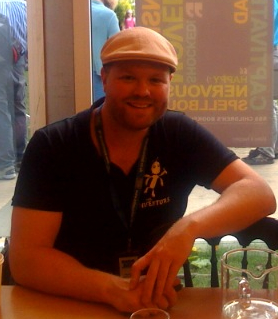A Quote by Patrick Rothfuss
Also, worldbuilding touches all aspects of your story. It touches plot and character as well. If you don't know the culture your character comes from, how can you know what he's really like? You must know your characters on a much deeper level than you would if you just shrugged your way into a cookie cutter fantasy world.
Related Quotes
When something arrives, you have no idea what's in it, which is good. And then, it's is the story leaps off the page at you and how your character functions within it. There could be just one scene and if it's wonderful, it doesn't matter how much you're working on it because you just want to be in it. It's really about what your character's day to day world looks like, and if you feel like that's something that's complete, and that you'd like to inhabit for awhile. You'll know by a couple of scenes in. If the character grabs you, you run with it.
Gettting to know your characters is so much more important than plotting. Working out every detail of your story in advance, especially when you don't yet know your main characters, always seems a little too much like playing God. You're working out your characters' lives, their destiny, before they've had a chance to discover who they are and what kind of people they want to be.
Meditation is a journey to know yourself. Knowing yourself has many layers. Start knowing your bodily discomforts. Know your success, know your failures. Know your fears. Know your irritations. Know your pleasures, joy and happiness. Know your mental wounds. Go deeper and examine every feeling you have.
I know what it's like to be so distracted by your surroundings and in the moment that it's seemingly impossible to not get caught up in 'em. I know what it's like to feel so much smaller than the activities of your environment that you can't see how not to succumb to 'em. I know what it's like to not be able to focus in class due to real life hunger pangs. I know what it's like to be disruptive just to pass the time and take your mind off what's lacking at home. I know what it's like to be laughed at by your teacher when you tell them what you hope to be in life.
When your fear touches someone's pain it becomes pity;
when your love touches someone's pain, it becomes
compassion. To train in compassion, then, is to know
all beings are the same and suffer in similar ways,
to honor all those who suffer, and to know you are
neither separate from nor superior to anyone.
Characters who are absolutely sure about what they do, who plunge ahead without fear, are not that interesting. We don’t go through life that way. In reality, we have doubts just like everyone else.
Bringing your Lead’s doubts to the surface in your plot pulls the reader deeper into the story, and this is an excellent way to coax the reader to lose himself in the story world you’re about to create.
Find someone who makes you laugh, allows you to be silly & be yourself, loves you when your at your best but loves you more when your not, kisses or touches you for no reason, looks at you in a way only you know what they're thinking and communicates with you in away your never afraid to share yourself.
Sometimes not honoring your character makes for really good television, but that also can really upset fans. You have to turn things upside sometimes. As a storyteller, you have to know that sometimes you're going to let your fans and the audience down because you have to do your part in servicing the story.
A dream inspiring a story is different than placing a description of a dream in a story. When you describe a character's dream, it has to be sharper than reality in some way, and more meaningful. It has to somehow speak to plot, character, and all the rest. If you're writing something fantastical, it can be a really deadly choice because your story already has elements that can seem dreamlike.
A writer can't just be well-educated or good at research; to build a living, breathing world with interesting characters, you have to write from the gut. I'm not saying you have to live your life like a fantasy adventure. The trick is the ability to synthesize your own everyday experiences into your fiction. Infuse your characters with believable emotions and motivations. Infuse your world with rich sensory detail. For that you have to be in touch with your own existence and your own soul, the dark and the light of it.






































